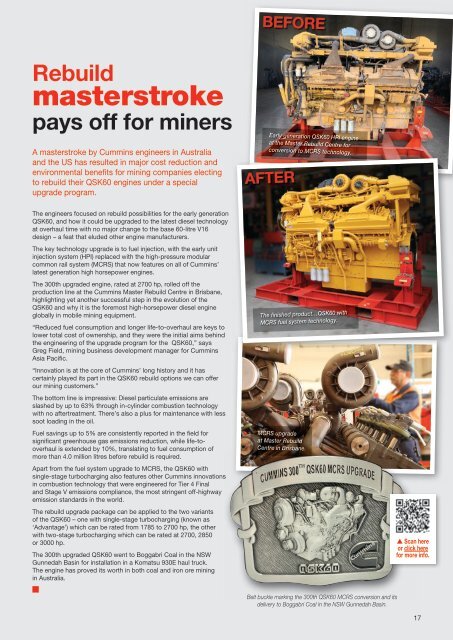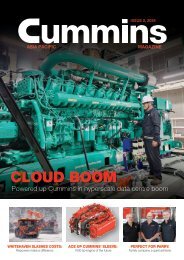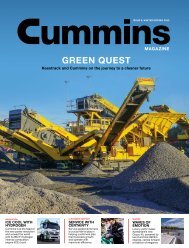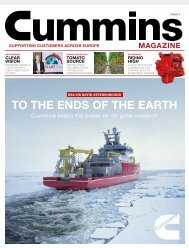Cummins Asia Pacific Magazine - Issue 1 2023
The 2023 edition of the Cummins Magazine for Asia Pacific is now available!
The 2023 edition of the Cummins Magazine for Asia Pacific is now available!
Create successful ePaper yourself
Turn your PDF publications into a flip-book with our unique Google optimized e-Paper software.
BEFORE<br />
Rebuild<br />
masterstroke<br />
pays off for miners<br />
A masterstroke by <strong>Cummins</strong> engineers in Australia<br />
and the US has resulted in major cost reduction and<br />
environmental benefits for mining companies electing<br />
to rebuild their QSK60 engines under a special<br />
upgrade program.<br />
Early generation QSK60 HPI engine<br />
at the Master Rebuild Centre for<br />
conversion to MCRS technology.<br />
AFTER<br />
The engineers focused on rebuild possibilities for the early generation<br />
QSK60, and how it could be upgraded to the latest diesel technology<br />
at overhaul time with no major change to the base 60-litre V16<br />
design – a feat that eluded other engine manufacturers.<br />
The key technology upgrade is to fuel injection, with the early unit<br />
injection system (HPI) replaced with the high-pressure modular<br />
common rail system (MCRS) that now features on all of <strong>Cummins</strong>’<br />
latest generation high horsepower engines.<br />
The 300th upgraded engine, rated at 2700 hp, rolled off the<br />
production line at the <strong>Cummins</strong> Master Rebuild Centre in Brisbane,<br />
highlighting yet another successful step in the evolution of the<br />
QSK60 and why it is the foremost high-horsepower diesel engine<br />
globally in mobile mining equipment.<br />
“Reduced fuel consumption and longer life-to-overhaul are keys to<br />
lower total cost of ownership, and they were the initial aims behind<br />
the engineering of the upgrade program for the QSK60,” says<br />
Greg Field, mining business development manager for <strong>Cummins</strong><br />
<strong>Asia</strong> <strong>Pacific</strong>.<br />
“Innovation is at the core of <strong>Cummins</strong>’ long history and it has<br />
certainly played its part in the QSK60 rebuild options we can offer<br />
our mining customers.”<br />
The bottom line is impressive: Diesel particulate emissions are<br />
slashed by up to 63% through in-cylinder combustion technology<br />
with no aftertreatment. There’s also a plus for maintenance with less<br />
soot loading in the oil.<br />
Fuel savings up to 5% are consistently reported in the field for<br />
significant greenhouse gas emissions reduction, while life-tooverhaul<br />
is extended by 10%, translating to fuel consumption of<br />
more than 4.0 million litres before rebuild is required.<br />
Apart from the fuel system upgrade to MCRS, the QSK60 with<br />
single-stage turbocharging also features other <strong>Cummins</strong> innovations<br />
in combustion technology that were engineered for Tier 4 Final<br />
and Stage V emissions compliance, the most stringent off-highway<br />
emission standards in the world.<br />
The rebuild upgrade package can be applied to the two variants<br />
of the QSK60 – one with single-stage turbocharging (known as<br />
‘Advantage’) which can be rated from 1785 to 2700 hp, the other<br />
with two-stage turbocharging which can be rated at 2700, 2850<br />
or 3000 hp.<br />
The 300th upgraded QSK60 went to Boggabri Coal in the NSW<br />
Gunnedah Basin for installation in a Komatsu 930E haul truck.<br />
The engine has proved its worth in both coal and iron ore mining<br />
in Australia.<br />
The finished product…QSK60 with<br />
MCRS fuel system technology.<br />
MCRS upgrade<br />
at Master Rebuild<br />
Centre in Brisbane.<br />
▲ Scan here<br />
or click here<br />
for more info.<br />
Belt buckle marking the 300th QSK60 MCRS conversion and its<br />
delivery to Boggabri Coal in the NSW Gunnedah Basin.<br />
17





